What do military Political Commissars do and how much do they get paid?
There’s an opening for this position at the Air Force Institute of Technology at Wright-Patterson AFB, Ohio:
Title: Chief Diversity, Equity, and Inclusion Officer Job in Wright-Patterson AFB, OH
Department: Air Force Materiel Command / Air Force Institute of Technology
Salary: $96,321.00 to $195,000.00
Summary: The primary purpose of this position is to perform academic administration duties as the Diversity, Equity, Inclusion, and Accessibility strategic leader, advocate, and principal advisor for the Air Force Institute of Technology, and its senior leadership.
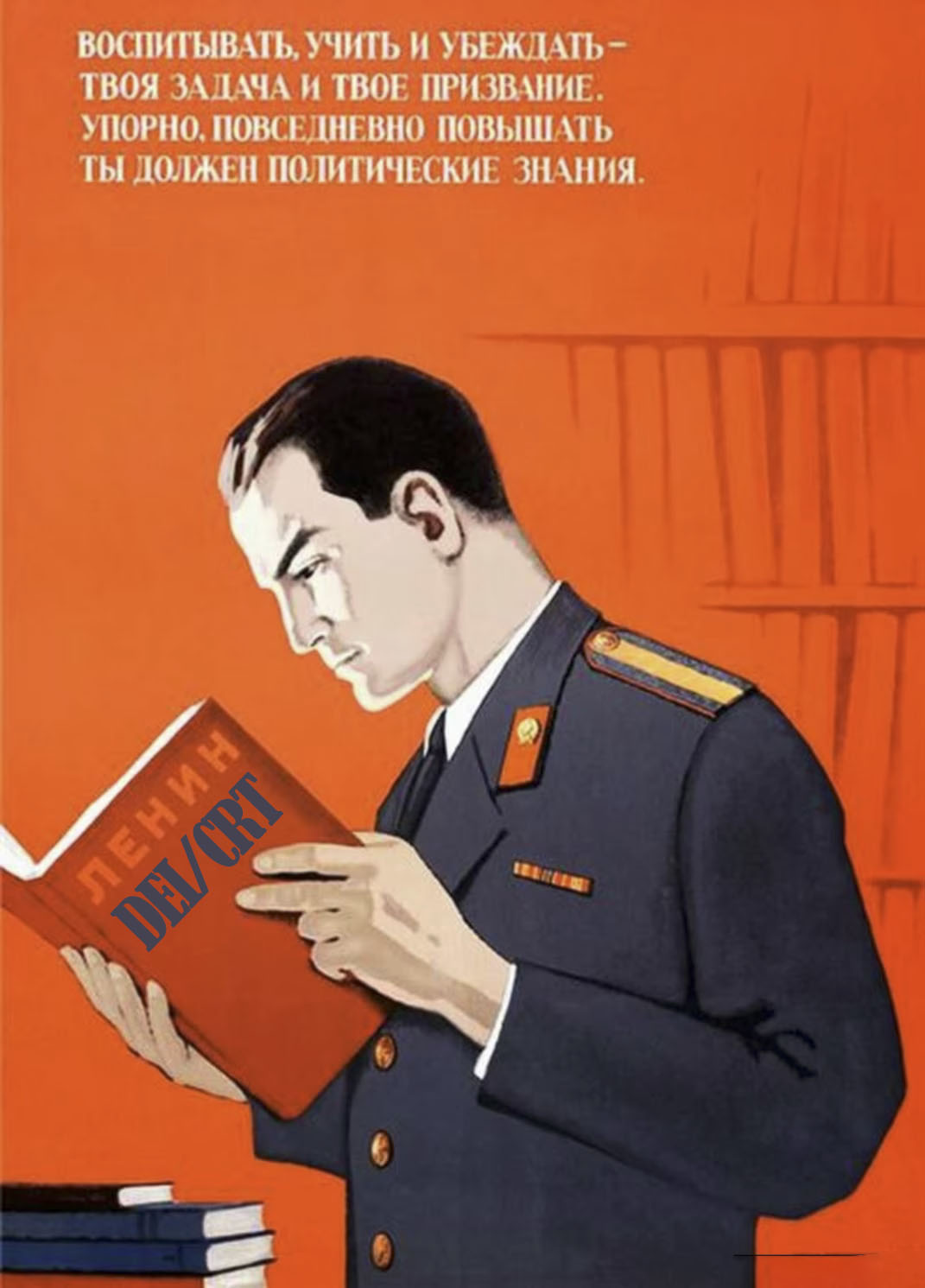
“To lead, to teach, and to persuade is your goal and your calling. You have to improve your political knowledge persistently on a daily basis.”
Duties:
• Lead, develop, direct, and drive policies related to diversity, equity, inclusion and accessibility by guiding, facilitating, and evaluating critical processes on behalf of the institute.
• Advance the commitment to DEIA and increase DEIA in all dimensions across the institute. Ensure subject area programs and activities are developed in accordance with federal, Department of Defense (DoD), Department of the Air Force (DAF), and AFIT guidance, policy architecture, and standards.
• Partner with the Chancellor, Provost, and AU Det 1/CC to cultivate and maintain an environment where members at all levels are stakeholders recognizing DEIA impacts on higher education and national security.
• Ensure the AFIT climate promotes a professional, diverse, and inclusive culture consistent with DAF vision. Work with the AFIT Chancellor, Provost, and AU Det 1/CC to effect AFIT’s strategic vision and education, leveraging all facets of the organization to further DEIA initiatives.
• Teaches, delivers workshops, instructs, and conducts briefings in areas of expertise. In collaboration with AFIT members, establishes and evolves courses, centers, and research activities to advance a measurable data-driven intellectual diversity platform. Partners with AFIT key military and civilian education, training, and leadership development functions to create, revise, and implement DEIA course modules, training, presentations, workshops, and/or seminars across AFIT education and training curricula, in a graduate-level higher education environment.
• Partners with faculty to facilitate and maximize inclusive teaching and learning practices. Nurtures a climate and culture of inclusive team dynamics, moral courage, and cultural competence through focused DEIA education, training, workshops, and leadership development.
• Researches and analyzes various forms of institutional data (e.g., academic achievement gaps, academic remediation, waiver requests, graduation rates, recruitment and retention of faculty, staff, and students) and reports to AFIT leadership with conclusions and recommendations. Researches and utilizes various forms of institutional data (e.g., attraction, recruitment, development, advancement, and retention of personnel) to evaluate and improve efforts. Researches, interprets, analyzes, and applies data to advance the goals of the AFIT DEIA strategy.
• As the primary DEIA subject matter expert (SME) and advisor to the AFIT Chancellor, develops and promotes a comprehensive, coordinated, and integrated approach where all AFIT members are stakeholders in the implementation of DEIA and related statutory policy program requirements AFIT-wide for the Total Force. Provides vision, direction, oversight, and perspectives on all major AFIT DEIA policy issues, strategic planning, and leadership initiatives derived from evidence-based practices. Develops, refines and implements the AFIT strategic change plan and approach for DEIA.
• Partners with the agency’s EO program to understand broader issues related to AFIT culture and climate. Presents written options and recommendations resulting from study efforts, planning requirements, etc. to both internal and external managerial and functional offices, including key high-level officials. Responds to DAF, AETC, and AU staff on inquiries regarding DEIA topics. Partners with faculty and staff to benchmark and implement best practices and reports results to AFIT leadership.
Qualifications:
An advanced degree (Master’s) is required by the time employment begins.
The ability to communicate clearly and expertly (in English) in both verbal and written forms concerning academic, administrative, and technical subject matters is required.
Desired Qualifications:
Two or more years of experience leading institution-wide (or equivalent) programs in cultural competence and DEIA practices, preferably in an academic or military environment
Two or more years of experience teaching, delivering workshops, or conducting briefings related to DEIA topics
Two or more years experience analyzing various forms of institutional data to inform DEIA policy development, preferably in an academic or military environment
An advanced degree in Social Sciences, Sociology, Ethnic studies, Human Services, Human Relations, DEIA Education, or History (or an interdisciplinary degree combining any of these or related fields of study) with emphasis in topics relevant to DEIA
A relevant terminal degree including coursework and/or dissertation research related to DEIA
Executive level experience in program development, management and resource allocation, ideally in positions of progressively higher responsibility
A high level of demonstrated personal initiative and leadership in significant group-oriented projects requiring creative problem solving skills
Experience presenting and defending independent positions on complex issues to sophisticated audiences
Air Force Institute of Technology
AFIT is an Equal Opportunity Employer and provides reasonable accommodation to qualified applicants with disabilities.
The Air Force believes that diversity is essential to accomplishing its mission.
AFIT highly values individuals who have a demonstrated ability to work successfully with and help develop individuals of diverse backgrounds and perspectives.
For the Air Force, diversity encompasses: personal life experiences, geographic background, socioeconomic background, cultural knowledge, educational background, work background, language abilities, physical abilities, philosophical/spiritual perspectives, age, race, ethnicity, and gender.
AFIT is dedicated to the goal of building a pluralistic faculty committed to a multicultural environment that enriches the educational experience of our students.
Hence, we are especially interested in candidates whose teaching, life experience and/or research interests contribute to a climate that values and uses diversity in all its forms.
Interested persons should submit a curriculum vitae and a letter of application that addresses
- your interest in the position;
- ways in which your qualifications meet the requirements of the position to include evidence of development and execution of successful DEIA activities in an academic, corporate or federal environment,
- DEIA curriculum development and instruction; and
- your leadership style, including your philosophy in leading a DEIA program in an academic setting.
Video about AFIT:
The Air Force Institute of Technology at Wright-Patterson AFB, Ohio, is the Air Force’s graduate school of engineering and management as well as its institution for technical professional continuing education.
A component of Air University and Air Education and Training Command, AFIT is committed to providing defense-focused graduate and professional continuing education and research to sustain the technological supremacy of America’s air, space, and cyber forces. (U.S. Air Force video by Matthew Clouse)
How do professional societies, like engineers, get taken over by Marxist DEI/CRT ideology?
More information about Political Commissars/Political Officers
. . . the Soviet armed forces possessed a dual military-political command and control system unique to the Communist totalitarian state. The Soviet Union developed a unique system of political-military controls in accord with its Marxist-Leninist principles and its Communist Party control of society. The Party’s preeminence in all public and private affairs had to be maintained in the military as it did in the Soviet society at large.
Even more so, because the armed forces represented a potential threat to the Party’s control of the state in several ways, institutionally as an alternative governance within the state, and the fact that the military controlled weapons and manpower capable of challenging or even overthrowing the state. Second, the Party needed to use the military as an agent of social control and change internally, as well as the primary means of external power projection in the competition of states. . . . .


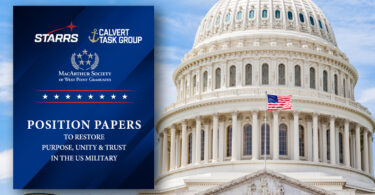
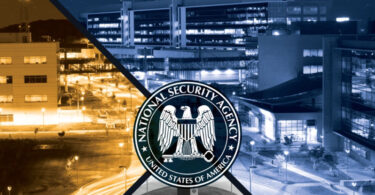
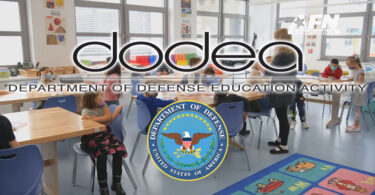
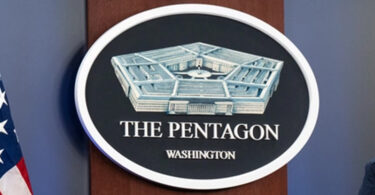


Leave a Comment